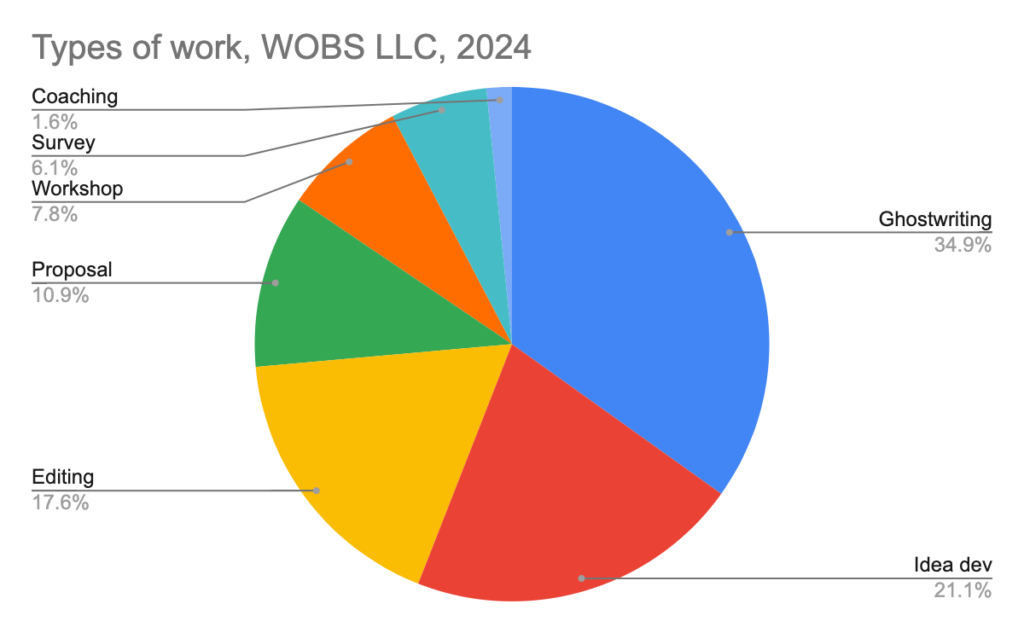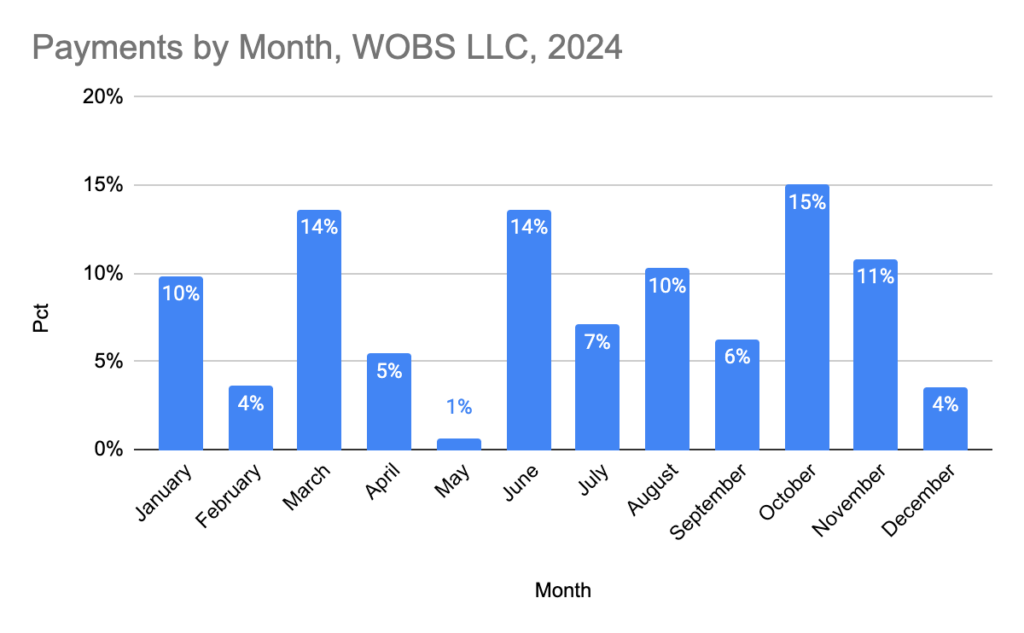A snapshot of my writing and editing business
For those considering making a living writing, ghostwriting, and editing, I thought you might enjoy a peek at what my 2024 looked like. I won’t share dollar numbers, but the total revenue was north of $100K, with me working about half of my time on client activities.
The last time I reviewed my business like this was in 2019; my work has evolved since then, focusing more on ghostwriting. I’m incorporated as WOBS LLC. Perhaps you can guess what WOBS stands for.
I had 20 paying clients in 2024. This is a manageable number for a one-person shop. A healthy 36% of my revenues came from one client: a large ghostwriting job sourced through a ghostwriting agency. Five other clients accounted for 6-8% of my revenues each; these included two book proposal, two big editing jobs, and a set of three writing workshops.
Ghostwriting accounts for about one-third of my revenues
Here’s a breakdown of what I charged clients for in 2024:

Ghostwriting accounted for more than one-third of my revenue; the large ghostwriting job occupied most of the year. I also generated 21% of my revenues from idea development, which is the first engagement I do with any author I start working with. I had eight different idea development clients in 2024, of which five have progressed to other work such as editing or book proposals. One is likely to turn into my next large ghostwriting job.
Editing manuscripts and chapters made up another large chunk of my business. So did developing book proposals. Of four author clients with proposals I helped write, two were picked up by publishers, one is currently being reviewed by agents, and one is still in process.
I did one set of “Writing Without Bullshit” corporate workshops this year. Corporate workshops were very lucrative for me in the first years of the pandemic, but I’ve now stopped doing corporate work now so I can focus on authors.
I was excited to work on the Business Book ROI author survey, a project for which Dan Gerstein, CEO of Gotham Ghostwriters, tapped me. I love survey work and writing reports based on surveys. I’m hoping that this highly visible research report turns into more data analysis work in the future.
Author coaching is a big business for some consultants like me, but I tend to do other sorts of jobs. Coaches have an incentive to keep authors dependent on them, and that’s not a model I want to embrace.
Word of mouth and a ghostwriting agency account for most of my business
A full 39% of my revenues in 2024 came from work with my agency Gotham Ghostwriters. Gotham takes a significant fee for sourcing and managing that work, but those are jobs I’d never have an opportunity to do without the agency, so it’s well worth it. It also helps that I’ve established a reputation in my work with them, so they think of me for the types of books I’m well suited for.
About 60% of my work comes from word-of-mouth referrals. These recommendations typically come from people who I’ve worked with on previous books, although some are from my blog.
Only 2% of my business came directly from my book on business book writing. However, the existence of that book and this blog are helpful in creating credibility with clients and in explaining to them how the book industry works.

A few insights on the nuts and bolts of getting paid
In 2024, 0.6% of my income went to fees for services like PayPal. It’s worth it to have a portal for online payments, but when possible, I refer people to fee-free services like Zelle or accept direct deposits.
Some people are slower to pay than others. Clients paid 20% of my bills immediately or even before I sent them. Within 30 days, 79% of the bills are paid. The slower payments came from corporations — the one for whom I did the workshops, and the ghostwriting client I billed through the agency. (The agency generally pays within a week or two of receiving funds from its client, but if the client is a company, that can sometimes take a month or more.) Of 51 invoices, only 3 took more than 60 days to pay. The longest it took to get an invoice paid was 66 days. (I currently have more than $20,000 in outstanding invoices from November and December that I expect will be paid in January.)
It’s a fact of life that freelance and consulting income is uneven. Here’s how mine came in during the year:

If the income was spread evenly throughout the year, you’d expect to see 8% of receipts every month. But as you can see, nearly no one paid me in May, which was a gap between payments in the big ghostwriting project, and February and December were lean months as well. Around mid-October I had no idea whether any significant revenue would come in for the rest of the year, but fortunately, a bunch of clients appeared almost immediately.
This business is highly profitable
I write off as much as is reasonable against the business, including software subscriptions, media subscriptions, internet access, mobile service, books, and my home office. Even so, the margins on a freelance business like this are healthy. I bill expenses like travel and project-specific content or subscriptions to clients.
What you can learn from this
I’ve been freelance for almost ten years now. Here’s what I’ve learned (and the data I just shared reinforces it).
- Build up a nest egg you can live on until the business gets large enough to support you.
- You can’t live paycheck-to-paycheck as you could if you had a regular job. Because of the unevenness of the timing of opportunities and payments, you need to set aside a reserve to live on during lean periods.
- Decide what repeatable work you are going to specialize in, and focus on that. That will shift over time. For me, that meant shifting from corporate work to editing to ghostwriting in the last ten years. But spend some time developing new projects that could turn into significant business, like my survey work.
- Agencies are extremely helpful, but your business shouldn’t completely depend on them. You need to diversify the sources of your referrals.
- Treat clients like royalty. Extreme competence, speed, dependability, and just being cordial all pay off. Because people don’t do a book every year, no individual client of mine comes back year after year, but their referrals certainly do.
If you make money from writing, ghostwriting, and editing, are you having a similar experience? I look forward to hearing about what works for you in the comments.
Interesting breakdown, Josh.
Like you, my writing business has evolved considerably since I began calling myself a professional scribe. As but one example, I used to be able to count on a good $4k/month from corporate writing gigs. I used to pen monthly thought pieces for a few tech companies, but they’ve largely abandoned these content-marketing efforts. Generative AI probably means the permanent end of that stream. That’s one reason that I intentionally built RacketHub and began selling Notion templates and development services.
I couldn’t agree more about the uneven nature of revenue and expenses.
Have a great holiday, and thanks for your insights this year. As usual, I learned a great deal.
Thanks for so generously sharing these insights into your business.